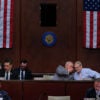Few issues before Congress have united online activists like the current debate over the Stop Online Piracy Act in the U.S. House and its Senate companion, the PROTECT IP Act. Both bills attempt to address the theft of intellectual property. But critics say the legislation would do more harm than good.
“The legislation addresses a legitimate problem,” noted Heritage’s James Gattuso in an analysis of SOPA, “but it may have unintended negative consequences for the operation of the Internet and free speech.”
We discussed those consequences on this week’s Scribecast with digital strategist Patrick Ruffini. He’s emerged as a strong critic of SOPA and PROTECT IP, helping conservatives understand the implications of the legislation. Ruffini is president of Engage, a digital agency in Washington, D.C. He previously handled online strategy for the Republican National Committee and Bush-Cheney campaign.
Listen to the interview with Patrick Ruffini on this week’s Scribecast
Senate Majority Leader Harry Reid (D-NV) is currently planning to bring the PROTECT IP Act up for a vote on Jan. 24. Yesterday six conservative U.S. senators warned Reid about the tight timetable for considering the legislation, asking him to allow for adequate debate.
“We are all in agreement that the online distribution and sale of pirated content and counterfeit goods impose a huge cost on the American economy in terms of lost jobs, lost sales, lost innovation and lost income,” the senators wrote. “We also believe, however, that we need to arrive at the right solution in the right way on this important topic.”
In the interview, Ruffini explains why the legislation has inspired a firestorm of online activism on the right and left among bloggers and other content creators. With a vote on the horizon, that activity is only likely to increase in the days to come.
The podcast runs about 12 minutes. It was produced with the help of Hannah Sternberg. Listen to previous interviews on Scribecast or subscribe to future episodes.





























2 Replies to “Scribecast: Patrick Ruffini Explains SOPA’s Unintended Consequences”